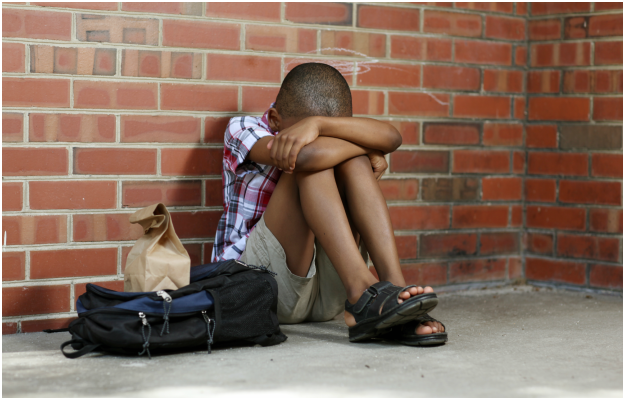
When her mom died suddenly in a taxi accident, 13-year-old Xolisa Ngcobo* felt a devastating loss. Fortunately, her grandmother was able to step in and Xolisa went to stay with her.
“I really missed my mom and it took me some time to settle in, but my grandmother was there for me,” Xolisa says. “She was my rock.” Sadly, tragedy struck again not long after Xolisa moved in – her grandmother passed away too. Xolisa went to live with her other grandmother, but the double loss was more than she could handle. “I felt empty and alone,” she says. “Life just didn’t seem to have any purpose.”
Xolisa began isolating herself from friends and family. Then, through school, she met Zanele Banisa, a facilitator with Khululeka Grief Support. Zanele sensed that Xolisa didn’t know how to express herself. “We used some of our activities to help Xolisa look at her thinking patterns and to identify her support network,” Zanele says.
“She was then able to identify and express her emotions.” Xolisa says she often cried in the sessions but the opportunity to talk to Zanele made her feel “found” again.
“Having a safe space where I was allowed to let go and feel was exactly what I needed,” she says. Here are some ways to help a child come to terms with loss.
1. Maintain routine
Figure out the child’s routine and stick to it. “The younger the child – babies included – the more important this is. Even when a child doesn’t understand death, it’s important to keep a routine in place,” Khululeka director Deborah Diedericks says.
Children do things at a specific time in a certain way, so someone needs to step in to maintain that. If a child loses a primary caregiver they experience a “broken attachment”, she says. The best way to stop this from happening is for someone to fill the gap.
Then a child learns that when things go wrong, other people will be there. “If that doesn’t happen, they learn that when things go wrong, they get left behind. This has a profound developmental impact,” Diedericks says. Try to stick to a routine and introduce changes gradually.
2. Be consistent and honest
A child will ask different people what happened to their parent. Make sure everyone tells the same story. “Children know death is a painful subject, but not allowing them to talk adds to their suffering and confusion,” says Banisa.
“Children need honest answers. If a parent died violently, stick to the truth without giving all the details. For example, say, ‘A cruel man hurt mummy and she died.’”
Young children understand things literally, so avoid euphemisms like ‘gone to sleep’. If you don’t tell them the truth, they’ll hear it from someone else or make up their own story, which could be worse. Sometimes adults think children need to be protected and a child is relocated to live with a relative without knowing why.
When six-year-old Babalwa Zulu’s* mother died, her family sent her to live with her grandmother in the Eastern Cape. “Babalwa was 12 before she found out her mother had died,” says Diedericks. She thought her mother didn’t want her any more and had sent her away. “Abandonment is considerably harder to cope with than death,” says Diedericks. “And in Babalwa’s mind, her mother had given her away.”
3. Give choices and causes
Explain what a funeral is and, if the child is old enough to understand, ask if they want to attend. Let them decide. Try to help them understand, according to your beliefs, where the person who has died is now. Make sure the child knows that their parent isn’t coming back and that the funeral is when people say goodbye. Explain what will happen during the funeral and afterwards regularly ask if they would like to visit the grave.
4. Model appropriate behaviour
It’s okay for you to cry and for a child to see you crying. Hiding your emotions is not healthy for anyone. Be honest about how you’re feeling, but find a middle ground.
Crying to the point that you are no longer functional – you stop feeding the child or stop doing chores – is not modelling good behaviour. “The child will learn that when things go wrong, things stop working,” Diedericks says.
“Show sadness and talk about the person who died and bring them into conversations. ‘Your mother would have loved that dress’ or ‘I wish your mother was here to celebrate your birthday.’ If you don’t show them how to behave, they will come up with less appropriate ways to cope with their grief.”
5. Each day is different: The "Whirlpool of Grief"
Some people think that during the grieving process a person moves through different stages, with each day being better than the last. But grief doesn’t follow a sequence or last a certain amount of time. It’s therefore important to allow a child to grieve in their own way.
British paediatrician Dr Richard Wilson, who worked closely with bereaved parents who’d lost a child through Sudden Infant Death (SID), devised the Whirlpool of Grief to try to help people understand their feelings better. “You’re in a boat with your family meandering down the river of life. At some point the bottom falls away and the boat tumbles down a waterfall. You all fall out of the boat and someone dies.
“As you reach the bottom of the waterfall you hit the whirlpool of grief. You’re gasping for breath, hardly able to keep your head above water. You go round and round in shock, in denial, not believing.
“At some point you end up on the rocks, battered and bruised and feeling as though you aren’t in your own life. You think you aren’t going to survive. But then, at some point, which varies for everyone, you find yourself back in the boat. There are other people in the boat and, for a moment, you think you may survive.
“Then, for no reason, you fall out of the boat and are back on the rocks – it may be a birthday, an anniversary, the first Christmas, no reason, but you are as crushed as before.
“Eventually you manage to get back into the boat and continue along the river of life. The boat doesn’t contain the same people but there are people in it – some from before and others that are new. You are back on the journey of life. Eventually, you find calm waters.”
6. Help the healing process
There are various activities that can help a child process grief and heal.
Create a memory box containing tangible memories – like a scarf or ring – of the person who died, or cut out images from a magazine that are reminders. This is useful for all ages and particularly if a parent died when the child was a baby.
Build a memorial by making a collage using all kinds of objects around the house, including images. This is helpful for all ages from three upwards.
Draw a freedom bird. When someone dies, we all wish we had told them certain things. A child feels the same way. The freedom bird is an opportunity to write down what they wanted to say. Draw the outline of a bird and then write messages on it. Explain that the bird flies up and sits on the lap of the person who died, taking the messages to them. This is useful when a child can write.
Colour a stripy remembrance painting. On a sheet of paper, draw lots of lines in different colours. Ask the child to cut holes in the lines for every person in their life who has died. The holes can be any shape and size. Let the child hold up the picture and see the gaps. At this point, the child’s life, like the picture, has a big hole with wind blowing through it.
They feel incomplete and empty, but explain that they won’t always feel that way. Give them another piece of paper to cut shapes to stick onto the back of the page covering the holes. Like the picture, their lives will never go back to the way they were but the gaping holes will close up. They will still miss the person, but won’t feel broken forever. This is helpful from ages four to 12.
*Not their real names.


















